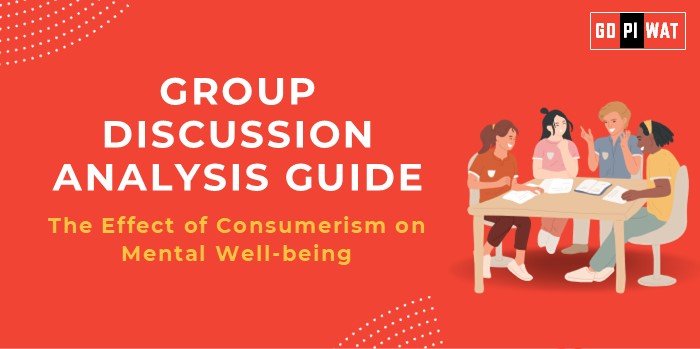📋 Group Discussion Analysis Guide: The Effect of Consumerism on Mental Well-being
🌐 Introduction to the Topic
Opening Context: “In an era where ‘more’ defines success, the rise of consumerism has reshaped societal norms, influencing not only our lifestyles but also our mental well-being.”
Topic Background: Originating from industrialization and globalization, consumerism encourages acquiring goods and services excessively. However, this mindset often affects emotional health, exacerbating stress, anxiety, and dissatisfaction.
📊 Quick Facts and Key Statistics
- 💰 Global Spending: Consumer spending reached $63 trillion globally in 2023, highlighting its pervasive nature.
- 🧠 Mental Health Impact: Over 30% of millennials link financial stress to excessive shopping habits (WHO, 2023).
- 📺 Advertising Influence: People are exposed to over 6,000 ads daily, fostering a culture of materialism.
- 📉 Debt Statistics: Household debt in the U.S. surpassed $17 trillion in 2023, a leading stressor.
- 📱 Social Media Effect: 72% of users report “comparison anxiety” stemming from influencers and online ads.
👥 Stakeholders and Their Roles
- 🌍 Governments: Regulate advertising and promote mental health awareness.
- 🏢 Corporations: Adopt responsible marketing and develop sustainable practices.
- 🛍️ Consumers: Shift towards mindful consumption.
- 🩺 Mental Health Professionals: Advocate for awareness campaigns on consumerism’s psychological effects.
- 🏫 Educational Institutions: Incorporate financial literacy and mental health programs.
🏆 Achievements and Challenges
Achievements:
- 📈 Economic Growth: Boost in GDP through consumer spending.
- 🌟 Awareness Campaigns: Initiatives like “Buy Nothing Day” challenge excessive consumerism.
- 🛋️ Minimalism Movement: Increasing adoption of minimalist lifestyles reduces stress.
Challenges:
- 🔍 Rising Mental Health Issues: Link between impulsive buying and depression.
- 💳 Debt Traps: Escalating personal debt worldwide.
- 🌏 Global Comparisons: Nordic countries balance consumption with well-being through cultural norms emphasizing moderation.
📖 Case Studies:
- 🇮🇳 India’s Credit Culture: Rising use of BNPL (Buy Now Pay Later) schemes exacerbates financial stress.
- 🇯🇵 Japan’s Hikikomori Phenomenon: Social withdrawal linked to consumerist pressures.
📚 Structured Arguments for Discussion
- ✅ Supporting Stance: “Consumerism drives economic growth and innovation, improving living standards.”
- ❌ Opposing Stance: “The pursuit of material wealth often undermines mental health, fostering anxiety and dissatisfaction.”
- ⚖️ Balanced Perspective: “While consumerism enhances economic prosperity, it necessitates mindful practices to mitigate mental health risks.”
🎯 Effective Discussion Approaches
- 💡 Opening Approaches:
- Use statistics like “30% of millennials link financial stress to shopping habits.”
- Start with a case study, e.g., Japan’s rise in depression rates due to consumerist pressures.
- 🛠️ Counter-Argument Handling: Highlight solutions like financial literacy programs or corporate responsibility initiatives.
🔍 Strategic Analysis of Strengths and Weaknesses
Strengths:
- 🚀 Drives innovation.
- 📈 Enhances standard of living.
Weaknesses:
- 📉 Promotes materialism.
- 💳 Escalates debt stress.
Opportunities:
- 🌱 Growth in sustainable products.
- 🧠 Emphasis on mental health awareness.
Threats:
- 📉 Global recessions.
- ⚖️ Social inequality.
🎓 Connecting with B-School Applications
- 🌟 Real-World Applications: Consumer behavior insights for marketing strategies, and its impact on organizational policies.
- ❓ Sample Interview Questions:
- “How can companies balance profit with consumer mental well-being?”
- “What role does financial literacy play in addressing consumerism’s challenges?”
- 📘 Insights for B-School Students: Explore the interplay of consumerism, economics, and mental health in project management or marketing strategy development.


